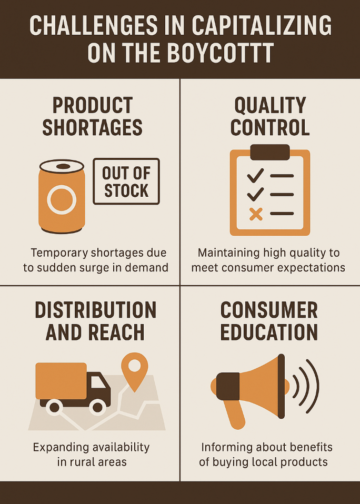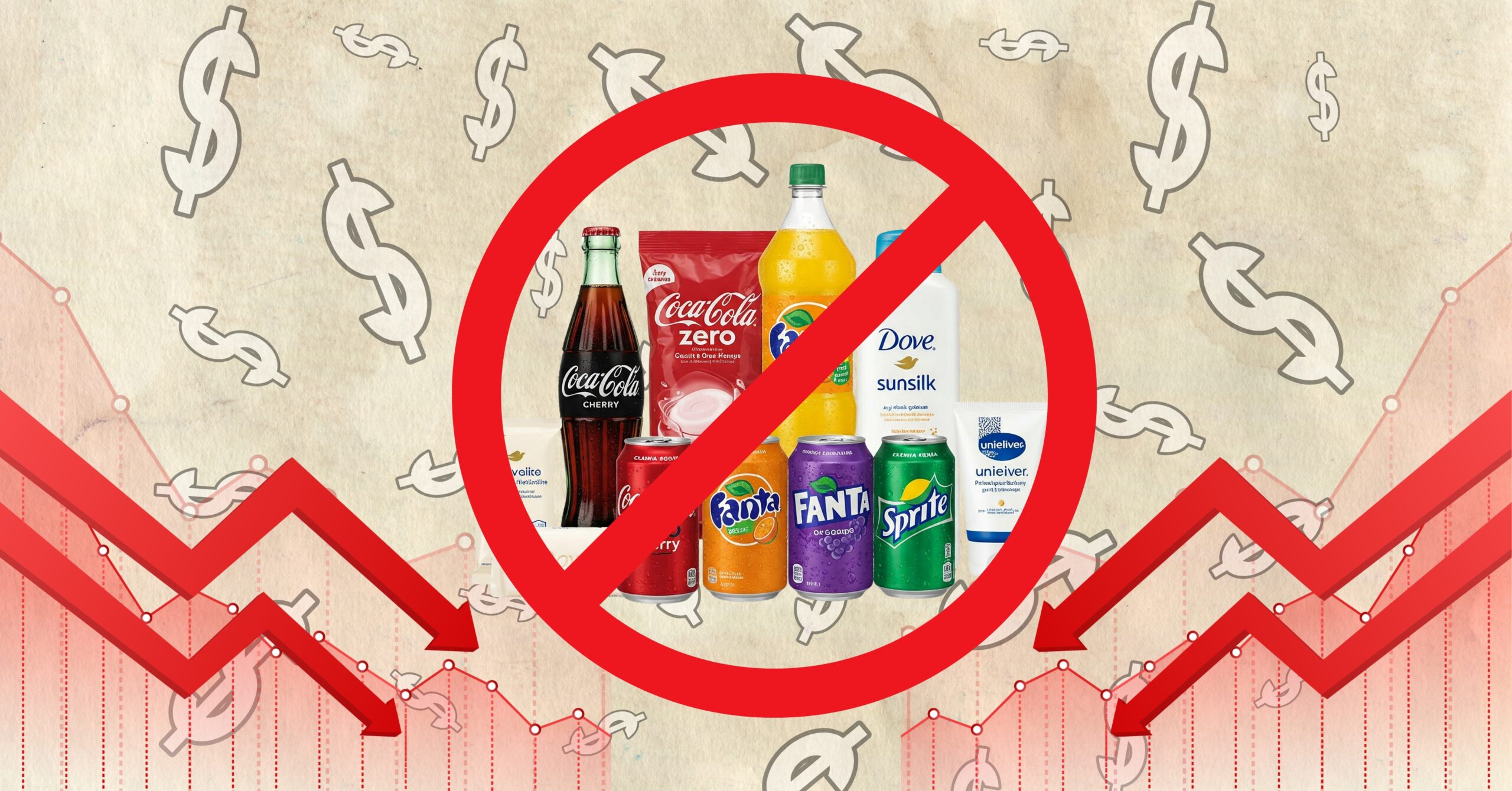In the wake of heightened global political awareness and humanitarian concerns, boycotting Israeli products has become a significant socio-economic movement. People around the world are boycotting Israeli products to protest against the actions of the Israeli government in Palestine. In Bangladesh, many people support this movement. Religious groups, students, and social organizations are encouraging everyone to stop buying goods linked to Israel. This article outlines the reasons behind the boycott, identifies popular Israeli products being replaced, and evaluates the impact of these replacements—particularly those supplied in large volumes—on Bangladesh. It also emphasizes the importance of Bangladeshi markets in responding to changes in global supply chains and the opportunity for domestic industries to benefit from the change.
Reasons Behind the Boycott:
The boycott is in response to the ongoing war between Israel and Palestine. People are convinced that, by boycotting Israeli-linked products, they will exert pressure on Israel to cease destructive behavior.In Bangladesh, religion, politics, and a sense of justice drive this movement. There are social media campaigns, and even youth protests, urging citizens to pick local products over foreign ones – like Coca-Cola and Johnson & Johnson.
Popular Israeli/Foreign-Linked Brands and Local Alternatives
The boycott of Israeli-linked products has led to an increasing demand for domestic alternatives. In Bangladesh, numerous globally recognized products are associated with Israel, or have business connections with Israeli companies. The movement has prompted consumers to switch to local alternatives in various categories, ranging from food and beverages to personal care products. Below are some of the popular Israeli-linked brands and their Bangladeshi substitutes:
- Toothpaste: International brands such as Pepsodent and Closeup are used frequently. In place of these, many consumers now look for local alternatives such as Mediplus DS and WhitePlus, which offer herbal and fluoride options.
- Soft Drinks: Coca-Cola, Pepsi, and Sprite are some of the most consumed beverages in the world
 . In Bangladesh, locally produced Mojo, Fresh Cola, Clemon, and Lemu are popular alternatives.
. In Bangladesh, locally produced Mojo, Fresh Cola, Clemon, and Lemu are popular alternatives. - Orange Drinks: International brands like Fanta and Mirinda are being replaced with local brands likes of URO Orange and Aafi, offering fruity flavor drinks made in Bangladesh.
- Mineral Water: Local drinking water brands like MUM, Fresh Drinking Water and Spa offer international standard of packaged drinking water inside Bangladesh similar to popular bottled water brands like Aquafina or Kinley.
- Footwear: Popular brands like Bata in many countries are being replaced by local brands like Apex and Bay that sell fashionable, low-cost footwear.
- Shampoo: International shampoo brands such as CLEAR, Sunsilk, and Dove are being replaced by locally manufactured alternatives such as REVIVE, and Meril.
- Washing Powder: Brands like Surf Excel, Rin, and Wheel have local substitutes like Fame, Fast Wash, and Keya, which are homemade and cost far less for detergent.
- Cream/Lotion: Skin-care global giants like Vaseline, Dove, Ponds, and Glow & Lovely are getting swapped with local options like Tibet, Meril, and Keya for a more contact-fulfilling skincare solution in Bangladesh.
- Baby Products: Global giants such as Johnson & Johnson are being replaced by golden local brands such as Meril Baby and Kodomo.
By providing local options, they are able to better serve the unique needs and preferences of Bangladeshi consumers while also supporting the country’s economy by creating jobs and stimulating local industries.
Read More: Transforming the Global Stage: Amazon’s Marketplace and the Rise of Empowered Entrepreneurs
Economic Impact on Bangladesh
Several economic benefits would be cited as a result of boycott of Israeli products by Bangladesh. The local shift has fostered local production, created job opportunities, and helped save foreign exchange.
- Local Manufacturing Growth: As consumers grow more selective about where their products come from, demand for these products increases. It all means that local manufacturers are stepping up production, which is translating into factory expansions, greater machine use and adoption of better technology. Economies of scale allow these factories to produce more, faster.
- Employment Generation: The increased interest in local items is reflected in the generation of new jobs. This increase in consumption brightens factories, delivery services and retail outlets. This is especially beneficial for small and medium-sized enterprises (SMEs), which tend to depend heavily on local demand to keep their businesses afloat.
- Foreign Exchange Savings: Another important economic benefit of the boycott is the savings in foreign exchange. When purchasing home-grown goods, Bangladeshis cut down the need for foreign currency to import Israeli or other foreign goods. This allows the country to save its paper money reserves, which could be put towards other important areas like infrastructure or social welfare.
- Revenue Growth of Domestic Companies: Local Companies will face booming demand for their products. With higher sales, they can invest back into their businesses, developing better products, hiring additional staff and further competing within their sector. These companies make a contribution to the overall economic growth of Bangladesh as they expand.
Societal Impacts and Consumer Behavior:
In Bangladesh, the boycott has contributed to the increase of significant changes in consumer behaviour and societal trends. People are increasingly aware of where the products they purchase have come from and the ethical implications surrounding those products, resulting in a rise in conscious consumerism.
- The Rise of Conscious Consumerism: Consumers are with their purchases, simplifying and choosing goods that reflect their values. Many consumers are checking the provenance of products to ensure that they are not supporting companies affiliated with or operating unethically in Israel. As a result, consumer attitudes are increasingly gravitating towards local ethical brands.
- National Pride and Cultural Identity: People often sense their own national pride as they turn to local brands. As they reflect the country’s cultural identity, these products are designed to meet the demand of Bangladeshi consumers. And buying local products connects us to a sense of solidarity with domestic industries as a part of a larger nationalist effort.
- Quality Perception and Brand Loyalty: At first, many customers might have seen local products with a critical eye,associating them with inferior quality compared to international brands But consumer trust is increasing as local businesses enhance their quality. Over time, many Bangladeshis have developed brand loyalty toward local alternatives, appreciating the value and quality they offer.
Challenges and Limitations
However, with the boycott creating a lot of opportunities for local industries, there are also numerous challenges that need to be solved with regards to the correct management of this situation.
1.Product Shortages
This initial surge in demand proved to be one of the biggest challenges for local industries. It has created temporary shortages of popular products.For example, during the Israel-Gaza conflict, Mojo, the local cola brand, witnessed a sharp rise of 130%-140% in their sales after they declared that they would donate Tk1 for every bottle sold for Palestine. The increase demand resulted in supply shortages, highlighting the challenges for local manufacturers to scale up manufacturing processes with little notice.
 2.Quality Control: Local manufacturers should maintain the high quality to compete with established international brands. However, when local products do not meet consumer expectations, they tend to lose loyalty. It makes it imperative for the local brands to ensure quality control for all their product lines for the long run.
2.Quality Control: Local manufacturers should maintain the high quality to compete with established international brands. However, when local products do not meet consumer expectations, they tend to lose loyalty. It makes it imperative for the local brands to ensure quality control for all their product lines for the long run.
3.Distribution and Reach
We have seen a surge in demand for local products in urban settings, yet they still suffer from limited reach in rural locations. It is important to have good distribution networks and better collaborations with retailers to be able to reach out to the locality catering to the demand, especially in the far-off areas.
4.Consumer Education
Consumers need to be aware of that, and more campaigns and educational initiatives are needed to inform them about the benefits of buying local products. Consumer behavior has to change because the highly-competitive nature of the Chinese and global economy can lead to a lack of cooperation and support for local industries, which ultimately detracts from the ability of China to empower itself.
Global Perspective and Strategic Collaboration
The boycott of Israeli products is not limited to Bangladesh; countries like Turkey, Malaysia, and Indonesia have also joined the movement. Bangladesh stands to capitalise on this by partnering with these countries in trade, sharing marketing strategies, and assisting in each other’s industries. Network Building: Bangladesh will need to focus on building networks by partnering with countries overseas to boost local industries and increase exports.
Conclusion
Bangladesh thus reaps a considerable economic benefit from a politically and humanitarian motivated boycott of Israeli products. By promoting consumption of domestically produced goods, the country is boosting local manufacturing, creating jobs and conserving foreign exchange. The long-term gains from domestic industries outweighs product shortages and even quality control issues. This boycott can turn into an opportunity for the country in terms of its economic development, cultural identity and national pride as consumer awareness is being increased and local industries are improving by leaps and bounds
References
REUTERS
The Business Standard
Middle East Eye


















